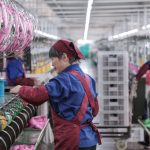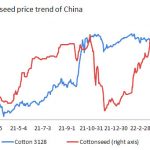An eminent Chinese environmental protection expert has called for clothing brands to honor their environmental protection commitments, after green groups announced that suppliers of 48 apparel brands and retailers were found to have violated policies on pollution control.“Some companies announced publicly that they would be responsible for environmental protection but in practice they eat their words,” Ma Jun, director of the Beijing-based Institute of Public and Environmental Affairs, told the media recently. Suppliers of 48 brands and retailers both from home and abroad including big names like Zara, H&M, adidas, Nike, Burberry, Lining and Anta are found to have records of violations including stealthily discharging or excessively emitting pollutants or using forbidden facilities, according to a report by five green groups released recently. “We hope these brands will incorporate environmental protection into their procurement considerations and stop buying goods from polluting suppliers,” Ma said. China is both an exporting and consumption powerhouse for textile products. The country’s fiber processing volume accounts for half of the total worldwide, according to CNTAC (China National Textile & Apparel Council). But pollution by the sector is colossal, Ma said, noting that China suffered from the discharge of an annual 2.5 billion tons of wastewater and pollutants, with 80 percent of wastewater discharged from printing and dyeing plants.
Japan Textile Industry Told Not to Use Dyes That May Cause Cancer
Tokyo – Japan’s Ministry of Economy, Trade and Industry has asked the domestic textile industry not to use 179 sorts of azo dyes that may cause cancer. According to the ministry, there is only a small possibility that the dyes are used in textile products distributed in Japan at present. The ministry’s move follows the European Union’s standards. If people wear clothes that use the dyes, bacteria on the surface of their skin may transform the dyes into carcinogenic substances to be absorbed into human body, according to the ministry. But there have been no reports so far that wearing such clothes actually caused cancer, the ministry said. Japanese textile importers and Chinese dye industry groups will cooperate in ensuring that the dyes are not used at Chinese factories that ship products to Japan, ministry officials said.
Zara, a Spanish brand owned by the global clothing retailing giant Inditex, couldn’t be reached for comment. Nike said it would ask problematic suppliers to publicize their rectification plans if necessary. Adidas promised to stop ordering from polluting suppliers in case they couldn’t correct mistakes, according to the media reports. The news drew different reactions from Chinese consumers, with some surprised or concerned about the report, and others calling for severe penalties by the government. “I would have a second thought in the future when buying these brands,” Qi Shan, an Anhui resident, said, but she also added that she may not have much choice as so many brands have been named in the report. Jin Zhen, a textile industry analyst with Guangzhou-based Wanlian Securities, believes the news will have limited impact on the sales of the brands. “There is no data supporting that negative news in the past have hurt the sales volume of these brands,” Jin observed. It is not the first time apparel brands have come under scrutinity. In March, toxic residues were reportedly found in products of brands like Nike, adidas, and H&M. In 2011, Zara, with some 120 stores in China by the end of 2011, was involved in several quality scandals.
Zhao Hong, VP of CNTAC, said that the Chinese textile sector is in transition from low to high value-added production and “it will take time for apparel brands to work out a practical way to control the whole supply chain.”





